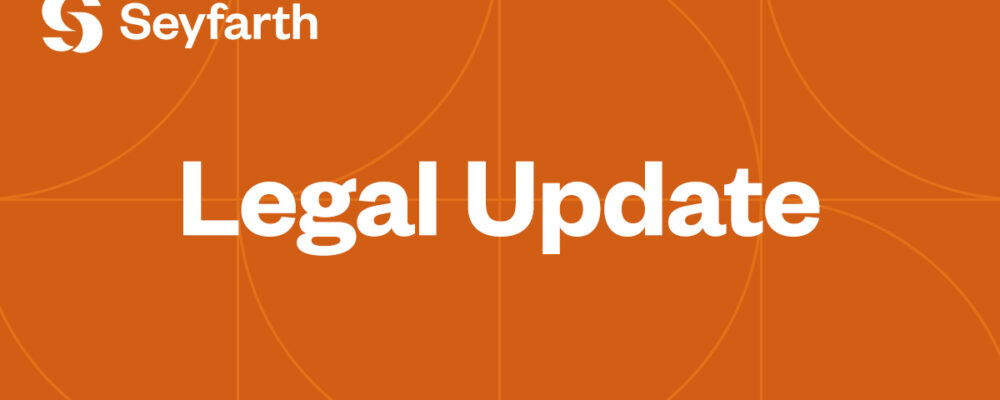In a recent advisory opinion following the National Labor Relations Board’s (NLRB) referral, the National Mediation Board (NMB) ruled on whether the Railway Labor Act (RLA) applies to Swissport Cargo Services, LP, a third-party ground service provider for airlines (i.e., a “derivative carrier”). Deviating from nearly 40 years of history, the NMB held that the RLA does not cover Swissport or its employees, reasoning that Swissport is not a “common carrier by air” and, therefore, it is not covered by the statutory text of the RLA. The current NLRB will almost certainly defer to the NMB’s opinion that Swissport’s EWR employees are not covered by the RLA and then rule that they are instead covered by the NLRA.
The NMB’s opinion raises important practical questions for airline service providers. Certainly, airline service providers facing organizing efforts now find themselves even more likely to be deemed covered by the National Labor Relations Act (NLRA). Additionally, airline derivative carriers currently in Section 6 negotiations under the RLA or with labor contracts pursuant to the RLA are left wondering how their negotiations and collective bargaining agreements will be impacted.
Background of the Swissport Case
Swissport provides ground services— such as baggage handling, fueling, and ramp services—for airlines at 16 airports, including Newark Liberty International Airport (EWR). The underlying dispute in the Swissport opinion arose when the Service Employees International Union (SEIU) and the International Association of Machinists (IAM) filed petitions at the NLRB seeking to represent Swissport warehouse employees at EWR. Specifically, the unions sought to represent the Swissport employees under the NLRA, not the RLA. This was likely because organizing under the NLRA would allow them to focus solely on the workers at EWR, whereas the RLA would require system-wide (i.e., nationwide) representation.
In response to the petitions, Swissport claimed its EWR operations and employees are subject to the RLA. On December 1, 2022, following a back-and-forth dispute between the parties regarding jurisdiction in connection with NLRB Region 22’s Decision and Direction of Election (DDE) finding that Swissport was subject to the NLRA’s jurisdiction, the NLRB referred the case to the NMB on the issue of jurisdiction. That referral resulted in the NMB’s advisory opinion.
The NMB’s Decades-Long Jurisdictional Test
Historically, the NMB has applied a two-part test to determine whether a derivative carrier’s employees are covered by the RLA. The first part examined whether the work performed by the employees was integral to air transportation operations. The second part assessed whether the derivative carrier is sufficiently integrated with the airline and under the airline’s control. If both parts of the test were met, the NMB deemed the airline service provider to be a derivative carrier under the RLA and not subject to the NLRA or NLRB jurisdiction.
The NMB’s Unanticipated Ruling That Derivative Carriers Have Never Existed Under the RLA
In the Swissport opinion, the NMB rejected its past use of the control element of the two-part test in the context of air carriers. The NMB explained that Title I of the RLA, which applies to rail carriers and their derivative carriers (but not to rail carrier’s independent contractors), contains the control element of the two-part test. However, Title II of the RLA, which governs air carriers, does not include this “control” language. The NMB interpreted this difference to mean that Congress intended for Title II to cover only air carriers themselves, not their derivative carriers.
In her dissent, NMB Chair Loren Sweatt (R) argued, in part, that derivative carriers exist under the RLA for policy reasons equally applicable to the air and rail industries, and Swissport’s EWR employees should be covered by the statute. Sweatt disagreed with the majority’s decision to read airline derivative carriers out of the statute after more than 40 years of including them. While she found the statutory language to be ambiguous, she said the purpose of the RLA—to avoid interruption of interstate commerce—is not, and thus, derivative carriers must exist under both Titles I and II of the RLA.
Sweatt emphasized that the RLA has never been interpreted by the NMB or courts to categorically exclude airline service providers. Instead, both have consistently used the NMB’s established two-part test to evaluate their status. According to Sweatt, this approach has successfully managed labor relations in the airline industry for decades. She cautioned that transferring jurisdiction over airline service providers to the NLRB would introduce political interference, create legal uncertainty, and disrupt the airline industry—issues the RLA was specifically designed to avoid.
The Swissport Opinion’s Practical Effects
Sweatt also noted the majority’s ruling calls into question some longstanding crafts or classes of derivative carriers under the RLA. The majority’s opinion has caused airline service providers currently covered by the RLA to question the status of their RLA jurisdiction and their collective bargaining agreements. As Sweatt explained, derivative carriers currently in Section 6 negotiations under the RLA may face jurisdictional challenges at the NLRB in order for their unions to gain immediate strike rights, especially following NMB’s advisory opinion.
The NMB majority’s opinion was likely in development for months, but its timing—just three days after the Presidential election—may have been influenced by the election results. By framing the decision as a statutory interpretation, the majority aimed to strengthen its position against potential legal challenges, especially if the Trump Administration’s NMB and NLRB later reversed course. However, courts might decline to defer to this interpretation or to any future reinterpretation by a Trump-era NMB or NLRB, particularly given recent rulings like Loper Bright. In this context, it wouldn’t be surprising if Congress is asked to amend the RLA to explicitly include airline service providers.
Airlines and their service providers should consider how this ruling might affect organizing, collective bargaining, and employee relations. Seyfarth’s Labor Management Relations Practice Group, Transportation & Logistics team and Air & Rail Specialty Group can provide comprehensive guidance to air carriers and their service providers on Swissport-related issues.
“With approximately 900 lawyers across 17 offices, Seyfarth Shaw LLP provides advisory, litigation, and transactional legal services to clients worldwide.”
Please visit the firm link to site





